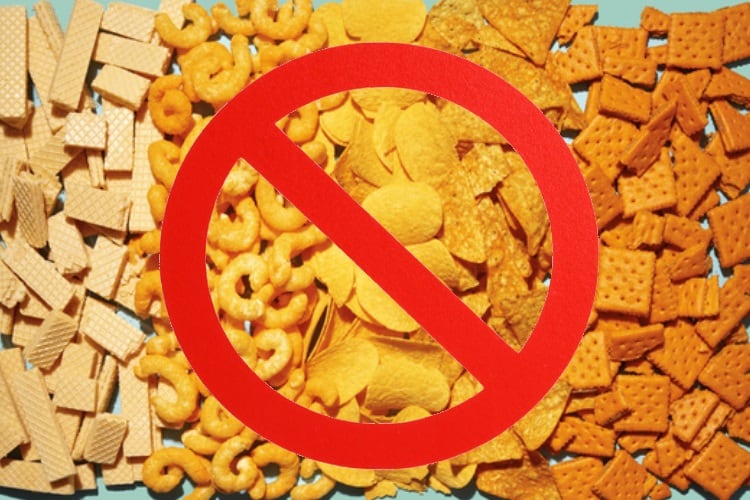The de facto recommendation of salt intake is no more than 6g a day (2.4g sodium, around 1 teaspoon) for the average adult (NHS), while the WHO recommends that adults should actually consume less than 5g (just under a teaspoon) daily.
However, few consumers stick to that benchmark, and excess salt consumption – which increases the risk of high blood pressure – is thought to be responsible for at least 2.5 million deaths across the world every year, mostly from strokes and cardiovascular disease.
Reducing salt intake is therefore a public health priority.
Since 2003, the UK Government has set a series of voluntary targets to encourage the food industry to reformulate products to contain less salt. These targets are not legally-binding, and it has been unclear how much progress has been made in recent years.
To investigate this, researchers from Oxford University assessed whether the amount of salt in a range of different foods sold in UK supermarkets had changed between 2015 and 2020.
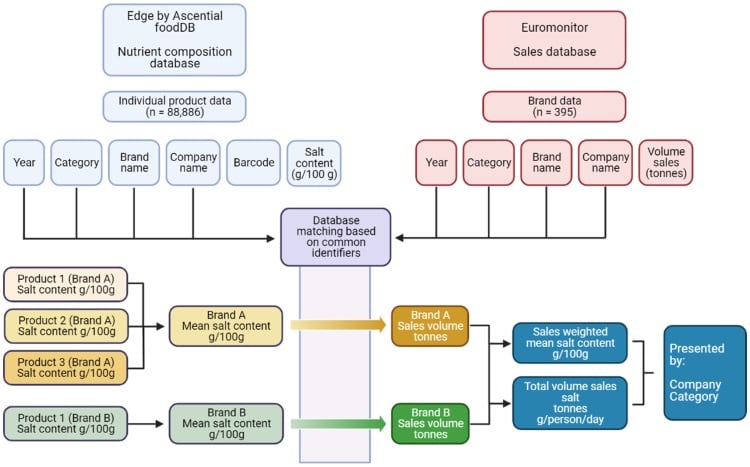
The study was based on the nine grocery food categories that contribute the most to adults’ salt intake in the UK, including bread, breakfast cereals and savoury snacks.
The analysis examined 8,000-9,500 products from 400 different brands from each year, but did not include table salt or salt consumed at restaurants, cafes or fast foods – meaning the total volume of salt consumed per person could worryingly, be a lot higher.
Key findings
The average salt content of all the product analysed fell by 5%, from 1.04g per 100g in 2015, to 0.99g per 100g in 2020, although this was not statistically significant.
The biggest reductions were seen in breakfast cereals (-16%), but there was no change for bread (-2%). Again, said the authors, none of the changes were statistically significant.
The categories with the highest salt content in 2020 were savoury snacks (1.6g per 100g on average) and cheese (1.6g per 100g). The NHS classifies products with more than 1.5g salt per 100g as ‘high’ in salt.
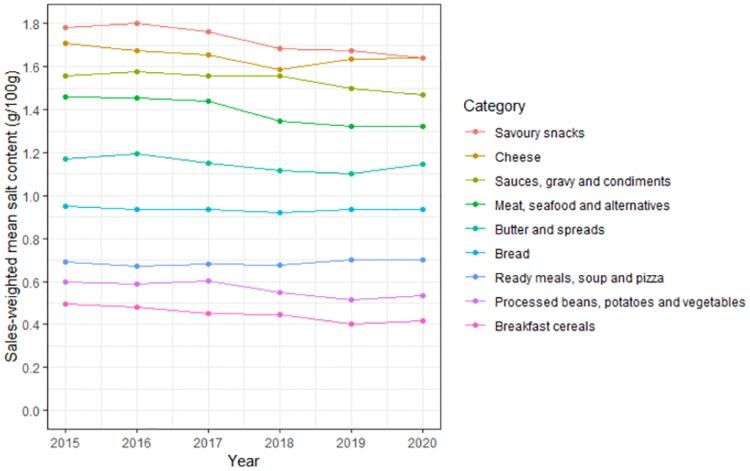
The total volume of salt sold from all products decreased from 2.41g per person per day in 2015, to 2.25g in 2020: a reduction of 0.16g per person (6.7%). Most of the salt sold came from three categories: bread (24%), meat, seafood and alternatives (19%), and cheese (12%).
The study delved even deeper into categories and companies.
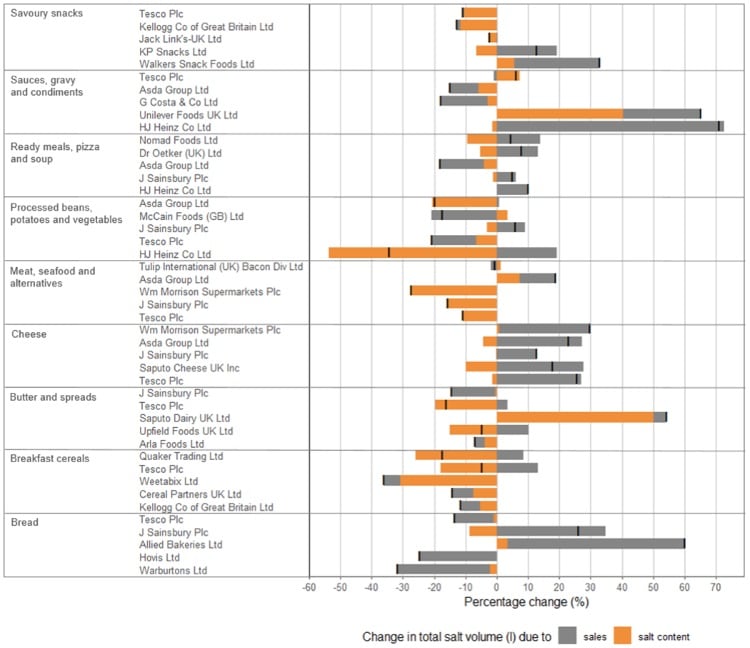
The volume of salt sold increased in pizzas, ready meals and soups, with any reduction of salt content offset by rising sales.
Overall, there has been little change in the average salt content and total volume of salt sold from these foods.
Shift voluntary to mandatory
According to the research team, several reasons may explain why little recent progress has been made to reduce salt in products.
Reformulating products is technically challenging, especially where salt acts as a preservative, a spice, an agent for colour maintenance or texture, and to regulate fermentation by stopping the growth of bacteria, yeast and mold.
There is also consumer resistance to low salt varieties; and nowadays, there’s been a more focused shift by policymakers to reduce sugar and calorie reduction instead to combat the obesity pandemic.
“Our results demonstrate that overall progress to reduce salt intake has stalled,” said lead author Dr Lauren Bandy (Nuffield Department of Primary Care Health Science, Oxford University).
“Voluntary targets alone may be insufficient to achieve the Government’s target of a population salt intake of less than 6g per day and additional policy measures might be needed to achieve further progress.
“This could include mandatory reporting of salt sales by manufacturers to improve transparency – as has been called for in the National Food Strategy.”
No longer fit for purpose
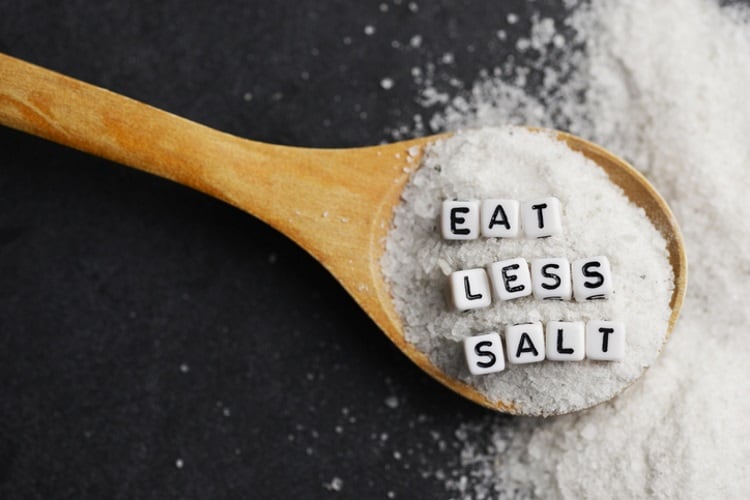
“The UK was once considered world-leading in our approach to salt reduction, but this paper and many others before it makes it clear that the voluntary approach is no longer fit for purpose,” added Prof Graham MacGregor, professor of Cardiovascular Medicine and chairman of Action on Salt (which was not directly involved in the study),
“Reducing salt is the most cost-effective measure for lowering blood pressure and reducing the number of people suffering and dying from strokes, heart disease and life changing disabilities.
“Failing to deliver on such a simple and effective public health strategy will have undoubtedly resulted in needless death and suffering, and should serve as a wakeup call to the Prime Minister that his focus should be on the people he was elected to serve.”
Methodology
The nine categories of products included bread; breakfast cereals; butter and spreads; cheese; meat, seafood and alternatives; processed beans, potatoes and vegetables; ready meals, soup and pizza; sauces and condiments; and savoury snacks.
Information on the salt content was sourced from foodDB and Eurominotor International, each of which collect product information, including nutrient composition data and retail sales data from the websites of the leading UK supermarkets.
foodDB was built by Oxford University researchers and collects info on around 120,000 products each week within the UK.
Study
Authors: Lauren K. Bandy, Sven Hollowell, Susan A. Jebb, Peter Scarborough
PLoS Med 19(10): e1004114.
doi.org/10.1371/journal.pmed.1004114



